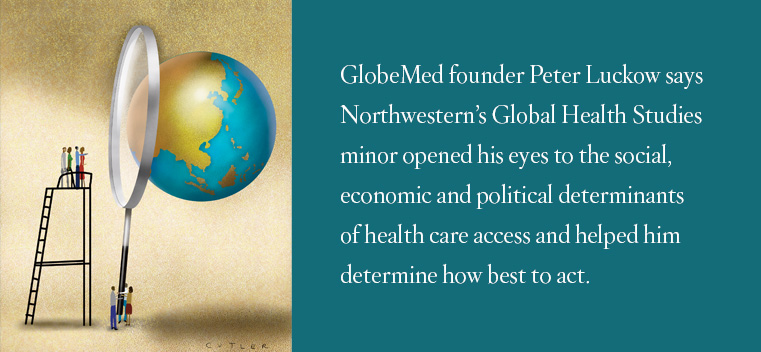
Examining World Health
Tell us what you think. E-mail comments or questions to the editors at letters@northwestern.edu.
Ever wonder about those strange designations we use throughout Northwestern to identify alumni of the various schools of the University? See the complete list.
Find Us on Social Media
The Global Health Studies minor prepares graduates to understand and address inequities around the world.
When Peter Luckow traveled to Liberia in 2009, the country was still recovering from a devastating 14-year civil war that ended in 2003. “Ninety percent of the health facilities throughout the country were looted or destroyed,” says Luckow (WCAS10). “After the war, in 2004, there were only 51 doctors left to serve a population of 4 million people.”
Luckow, then a junior anthropology major and global health studies minor, set out on a Northwestern-approved research project in Liberia for Tiyatien Health. At the time the nongovernmental organization provided in-home HIV treatment to people who in the past had to travel up to 15 hours to receive treatment in Monrovia, the West African nation’s capital, or they would have died. “And that’s often what ended up happening,” Luckow says.
He spent dozens of hours interviewing people with HIV and community health workers who were bringing medical care to remote villages in southeast Liberia. “I started to understand both the moral importance and imperative of this work, as well as what was working and what wasn’t in the global health delivery landscape,” Luckow says.
He joined Tiyatien full time after graduating from Northwestern and now splits his time between Boston and Liberia as the organization’s chief operating officer. Luckow has helped grow the Tiyatien staff from 24 to more than 100, with three offices in Liberia and one in the United States and a $1.2 million budget.
Luckow, who was among the founders of GlobeMed (a student organization that started at Northwestern in 2007 and now has chapters at 50 universities across the country), says Northwestern’s Global Health Studies minor opened his eyes to the social, economic and political determinants of health care access. “And I was offered through these courses multiple frameworks to make sense of the challenge of global health and figure out how best to act.”
There are now close to 300 students in the global health minor, which has been offered by the Office of International Program Development since 2004. In the spring Northwestern received a 2013 Senator Paul Simon Spotlight Award from NAFSA: the Association of International Educators for its efforts to internationalize the curriculum through the program.
The Global Health Studies minor, the only Northwestern academic minor or major that requires an international experience, offers overseas opportunities in Chile, China, Cuba, France and South Africa. A new site is expected to begin in Israel in spring 2014. These international experiences include specially designed courses, often taught by local expert faculty, about the host country’s public health system and an issue of interest — HIV and AIDS in South Africa, for example, or traditional medicine in China. In Israel students will visit Arab villages, Bedouin settlements and ultra-orthodox Jewish communities to study health care access. They’ll also participate in training for a national emergency response team.
“Global health affects us in so many ways,” says Dévora Grynspan (WCAS76, G83), director of IPD. “Our borders are porous. Viruses travel. We spend billions of dollars in foreign aid to fight not only the ravages of disease but also the political instability that is generated when you lose so many people. We have to act in a more effective way, and our students will know what questions to ask when they’re engaged in policymaking and managing these programs.”
William Leonard, chair of the anthropology department and academic director for the minor, calls Global Health Studies a signature “one Northwestern” initiative because it draws students from programs in all of the undergraduate colleges, including the social sciences and humanities, science and engineering, journalism, communication, social policy and even theater, art and dance.
Grynspan is trying to expand access to the program to underrepresented students, including low-income students through donor-funded fellowships. She’s also working to provide funding for students to go abroad with a professor for supervised research experiences.
Luckow says Northwestern has the right approach when it comes to global health. “Northwestern has targeted that intersection — the knowledge that comes through academic exploration, combined with the practice of being a global citizen and truly understanding firsthand what’s happening with those who are bearing the brunt of the suffering in this unequal world — and that’s everything.”



 Facebook
Facebook Twitter
Twitter Email
Email


